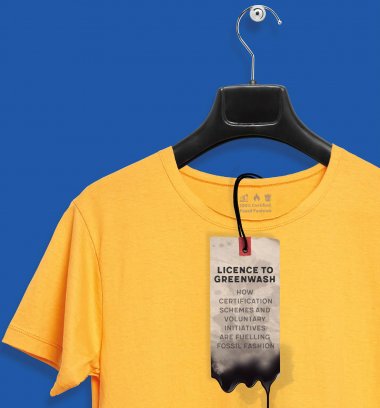
Brands urged to take action on synthetic fibres
Sustainability certification schemes and voluntary initiatives serve as a smokescreen it is alleged.

25th March 2022
Innovation in Textiles
|
Netherlands
Certification schemes, labels and industry initiatives aimed at steering the fashion industry onto a greener course are actually acting as a smokescreen for its continued heavy toll on the planet, a new report finds.
Licence to Greenwash by the Changing Markets Foundation analysed ten certification labels and industry initiatives used by fashion brands to assess or measure their sustainability, investigating whether these schemes are fit for purpose in addressing the harms of the modern fashion industry.
The report investigated schemes such as the Ellen MacArthur Foundation, The Textile Exchange, WRAP (Waste & Resources Action Programme), Cradle2Cradle, and The Higg Index by the Sustainable Apparel Coalition (SAC).
It assessed their level of ambition, the scope for continuous improvement, independence, transparency and track record of performance – finding no scheme to be fit for purpose.
"These schemes are unambitious, unaccountable, compromised talking shops that result in an industry-wide decoy for unsustainable practices, enabling sophisticated greenwashing on a vast scale." - Changing Markets Foundation.
Analysis showed that across the ten certification schemes, all failed to hold sufficiently high standards, all lacked accountability and all are procrastinating on progress on the issues of circularity, including overproduction, the rise of fast fashion, and the industry’s reliance on fossil fuels.
The SAC, for example, was found to have created no measurable impact over the last decade. The SAC’s Higg Index also allows brands to cherry-pick which issues they want to engage with and rates fossil-fuel derived synthetics as the more sustainable choice.
As the number of voluntary initiatives to address fashion has increased over the last five years it appears that the industry is addressing concerns regarding sustainability.
Yet the report shows that the industry’s environmental impact has worsened significantly over the same period. In just the last 20 years, the use of polyester fibre has more than doubled, driving the industry’s reliance on continued extraction of fossil fuels, and fuelling overproduction and mountains of waste.
“While fashion brands double down on production and environmental destruction, they’re using sustainability certification schemes and voluntary initiatives as a smokescreen,” said George Harding-Rolls, campaign manager at the Changing Markets Foundation. “These schemes are unambitious, unaccountable, compromised talking shops that result in an industry-wide decoy for unsustainable practices, enabling sophisticated greenwashing on a vast scale.
Placebos
“We don’t need any more voluntary schemes. Certification and initiatives such as those in the report act as a placebo, creating a false promise that the industry will address sustainability voluntarily. We urgently need comprehensive legislation to change the course of the fashion industry onto a greener path.”
The report argues that policymakers and customers alike are lulled into a false sense of security through these initiatives. This has resulted in systemic reforms being delayed and derailed, such as laws that would drive greater transparency and circularity.
The report shows how certification schemes are providing a licence to greenwash allowing brands like Primark and Boohoo to even escape accountability for policymakers. For example, Boohoo used its membership of initiatives such as the SAC, WRAP and The Microfibre Consortium to pull the wool over the eyes of the UK’s Environmental Audit Committee while under scrutiny over its 2020 slavery scandal, despite the schemes they cited being unambitious and underperforming.
Market research by the Changing Markets Foundation has found that one in three (34%) of consumers in the UK are choosing to purchase items with green labels or certifications either frequently or always.
In one they also stated that they look upon certification schemes or third-party initiatives as trusted sources of information on brands’ green credentials, highlighting the need for the flaws of such schemes to be urgently addressed.
Greenwash.com
The Changing Markets Foundation is now also bringing the public’s attention to the fashion industry’s greenwashing tactics, including with the recent launch of Greenwash.com. The website underscores fashion’s greenwashing problem by showing consumers just how widespread it is across products, projects and adverts from fast fashion, high street retailers and luxury brands.
The report comes ahead of the EU strategy for sustainable textiles, due to be published on 30th March, that will address the overconsumption and waste produced by the industry as a result of fast fashion.
The strategy will aim to create a more circular model, as the textile sector is currently the fourth highest pressure category in the EU in terms of use of primary raw materials and water, after food, housing and transport, and one of the most wasteful.
Currently, Europeans consume on average 26kg of textiles per person per year. As each piece is used for only a short period of time, this results in over 11 kg of textiles being discarded per person per year.
This new report recommends that all but the most ambitious schemes should be abolished, and the industry should instead focus on ushering in ambitious mandatory requirements through legislation. Any remaining voluntary programmes should remove conflicts of interest, strive for impartiality, embrace a more holistic approach to the whole lifecycle of products and require brands to transparently publish information, which needs to be audited by a third-party

Business intelligence for the fibre, textiles and apparel industries: technologies, innovations, markets, investments, trade policy, sourcing, strategy...
Find out more